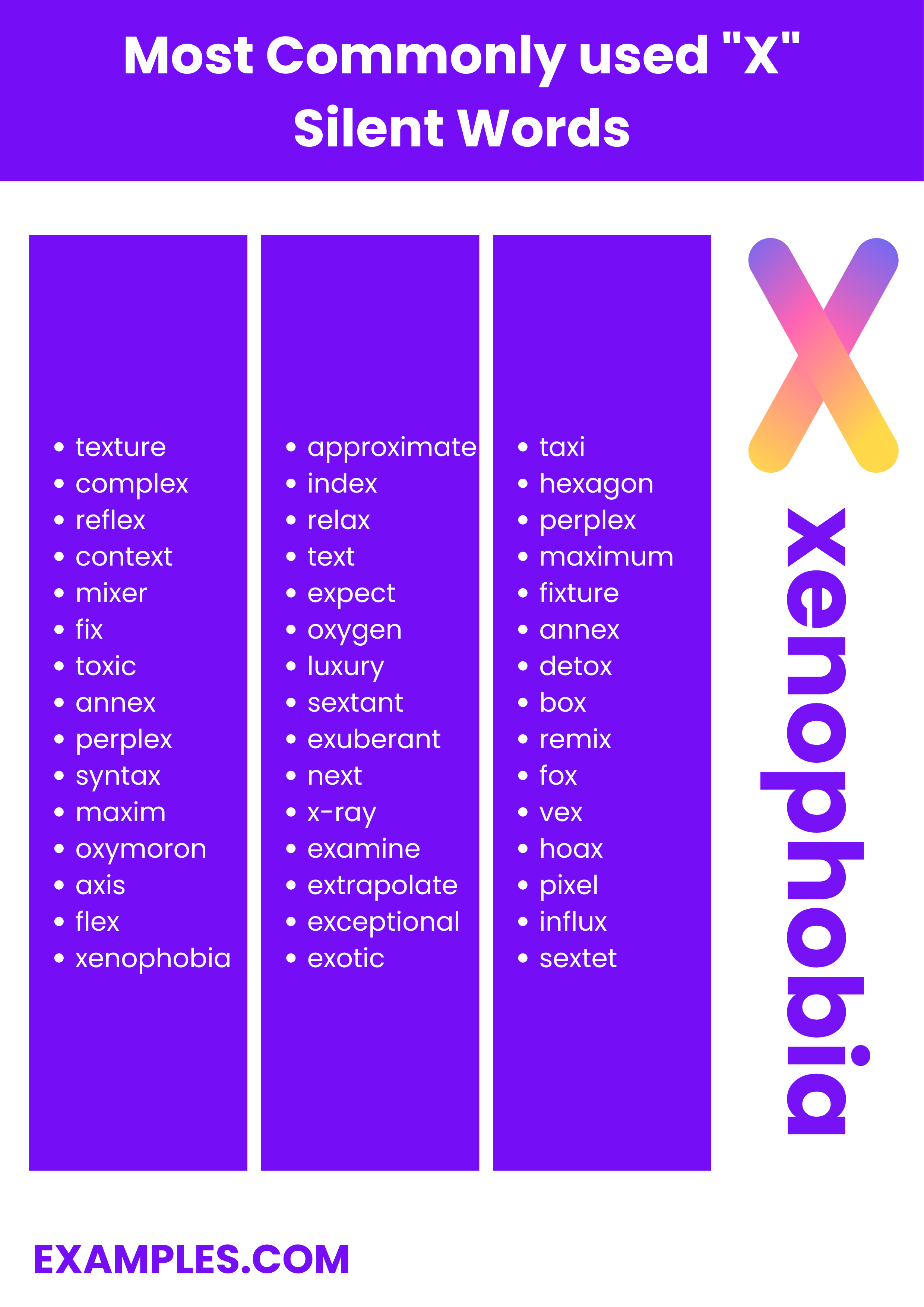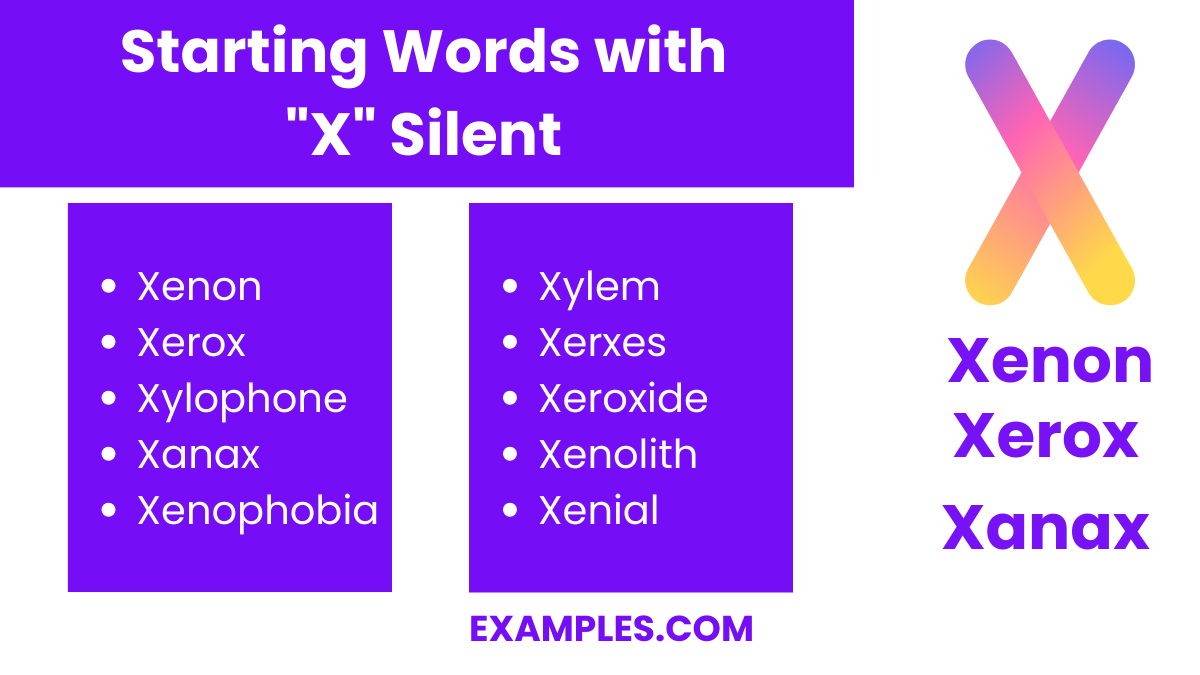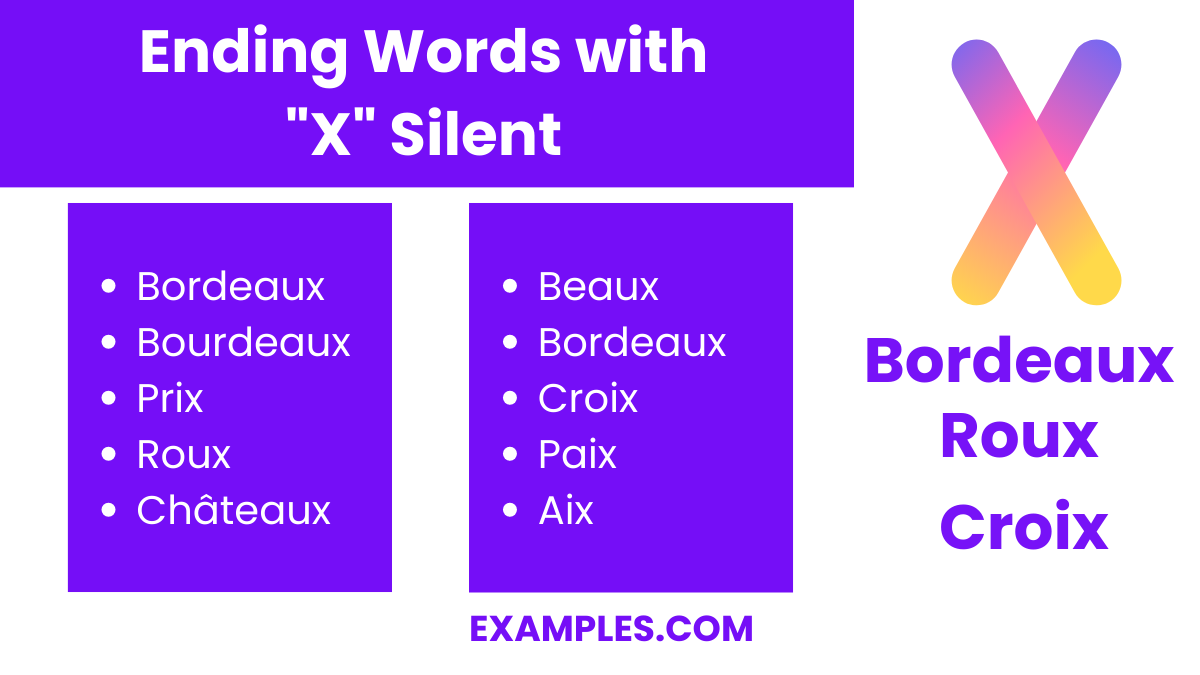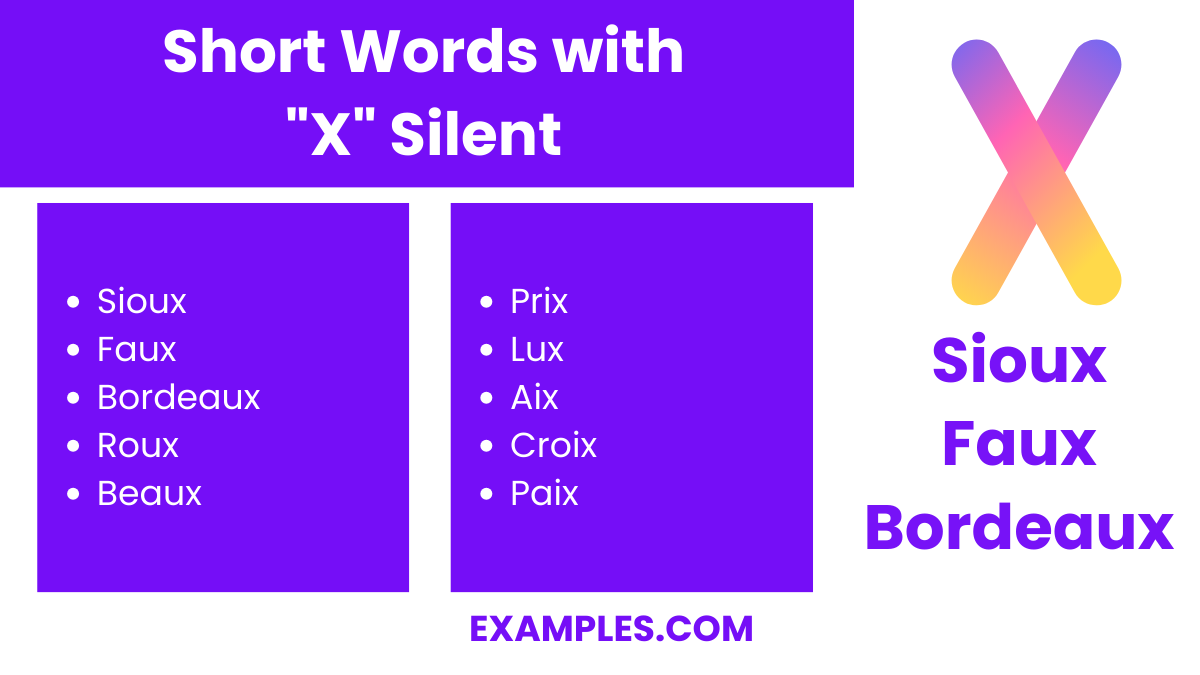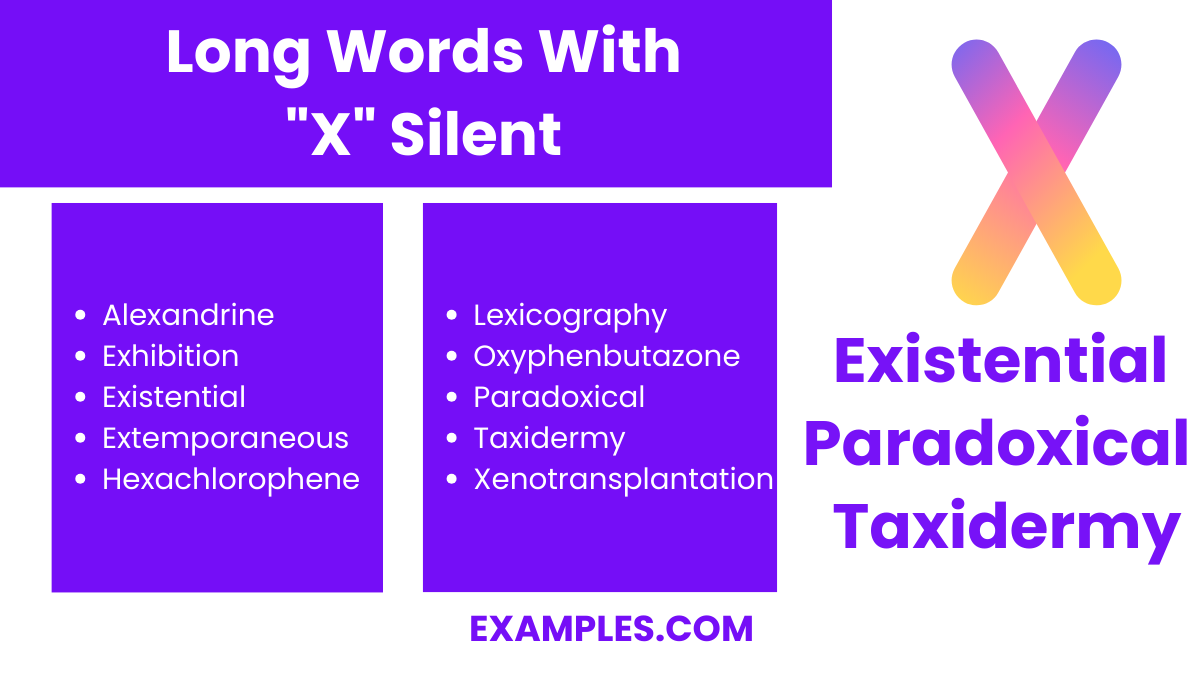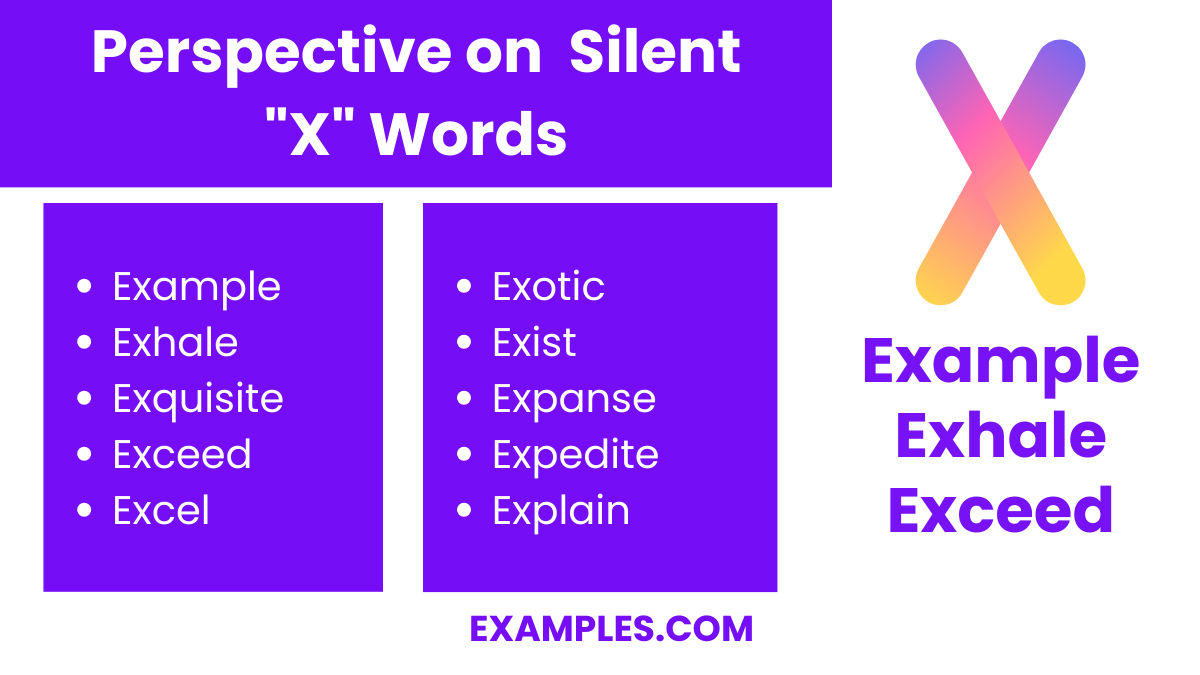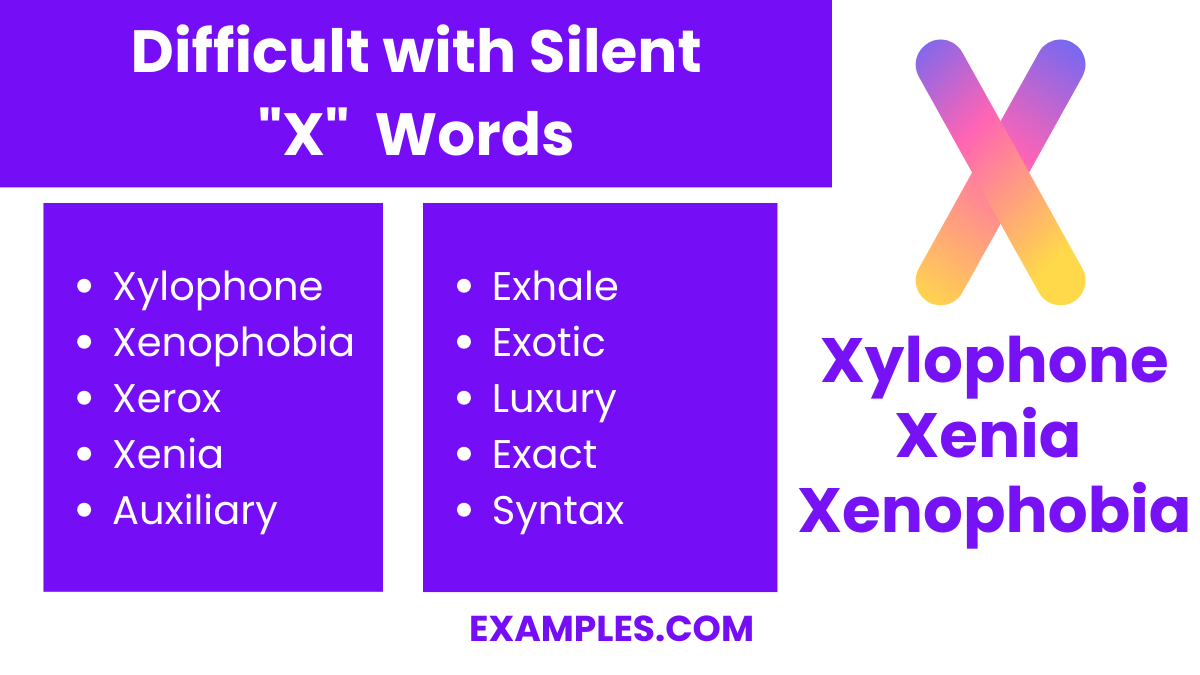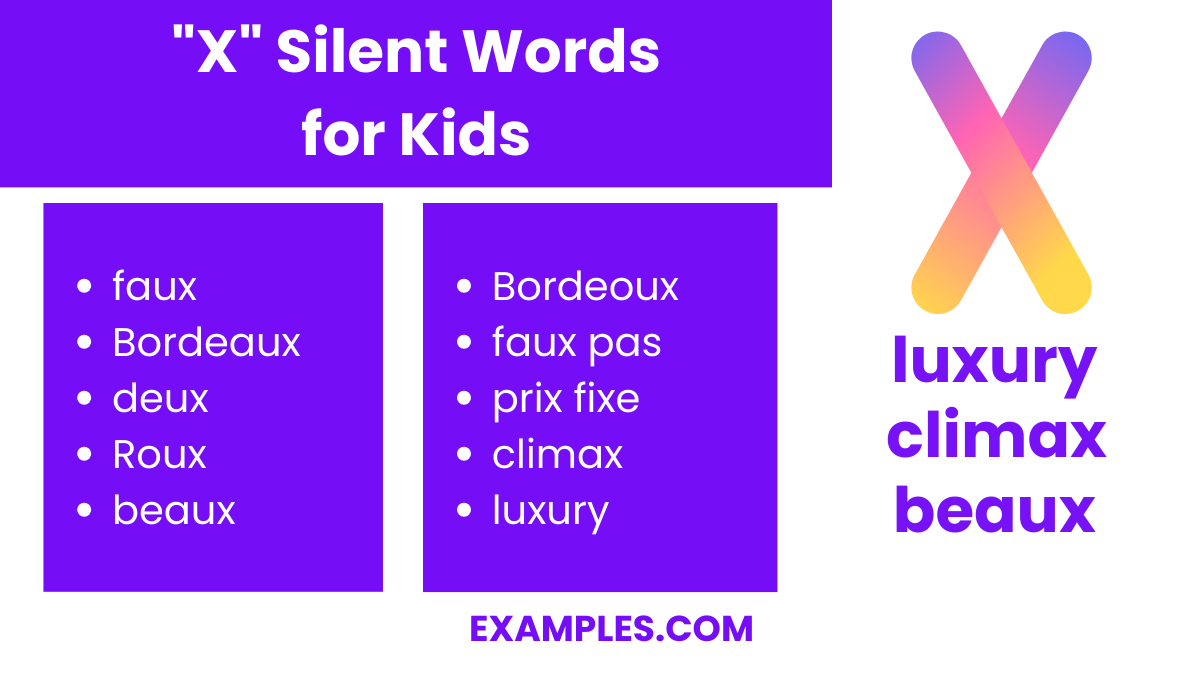450+ X Silent Words List, Meaning, PDF
The English language is a complex tapestry, woven with a myriad of rules, exceptions, and peculiarities that can perplex even the most diligent learners. Among these intricacies, silent letters stand as silent sentinels, challenging our pronunciation and comprehension. These silent ‘X’ words letters are vestiges of the language’s rich history, remnants of its evolution over centuries. They lurk in words, often invisible to the eye but crucial for spelling. Understanding these silent words is essential for mastering English pronunciation and spelling, offering a window into the language’s past and a key to unlocking its present.
Download Most Commonly used X Silent Words - PDF
30+ Most Commonly used “X” Silent Words
I understand you’re requesting a focus solely on words with “X” as the silent letter. In Daily Use English Words, the letter “X” is typically pronounced, often as /ks/ or /gz/, making it challenging to list words where “X” is completely silent. However, “X” can be less pronounced or subtly influence the pronunciation in some dialects or words, especially in compound words or those with Greek origins where “X” is pronounced as “Z”. Here’s a focus on words that feature “X” in a prominent role.
| texture | [ˈtɛkstʃər] | approximate | [əˈprɒksɪmət] | taxi | [ˈtæksi] |
| complex | [ˈkɒmplɛks] | index | [ˈɪndɛks] | hexagon | [ˈhɛksəɡɒn] |
| reflex | [ˈriːflɛks] | relax | [rɪˈlæks] | perplex | [pərˈplɛks] |
| context | [ˈkɒntɛkst] | text | [tɛkst] | maximum | |
| mixer | [ˈmɪksər] | expect | [ɪkˈspɛkt] | fixture | [ˈfɪkstʃər] |
| fix | [fɪks] | oxygen | [ˈɒksɪdʒən] | annex | [ˈænɛks] |
| toxic | [ˈtɒksɪk] | luxury | [ˈlʌkʃəri] | detox | [diːˈtɒks] |
| annex | [ˈænɛks] | sextant | [ˈsɛkstənt] | box | [bɒks] |
| perplex | [pərˈplɛks] | exuberant | [ɪɡˈzjuːbərənt] | remix | [ˈriːmɪks] |
| syntax | [ˈsɪntæks] | next | [nɛkst] | fox | [fɒks] |
| maxim | [ˈmæksɪm] | x-ray | [ˈɛks reɪ] | vex | [vɛks] |
| oxymoron | [ˌɒksɪˈmɔːrɒn] | examine | [ɪɡˈzæmɪn] | hoax | [hoʊks] |
| axis | [ˈæksɪs] | extrapolate | [ɪkˈstrɒpəleɪt] | pixel | [ˈpɪksəl] |
| flex | [flɛks] | exceptional | [ɪkˈsɛpʃənəl] | influx | [ˈɪnflʌks] |
| xenophobia | [ˌzɛnəˈfoʊbiə] | exotic | [ɛɡˈzɒtɪk] | sextet | [ˈsɛkstɛt] |
Starting Words with “X” Silent
English words starting with “X” often challenge conventional pronunciation rules, particularly in words of Greek origin where “X” is pronounced as /z/ or similar sounds. This distinctive pronunciation can lead to misconceptions about the “X” being silent. To clarify and enhance understanding, we delve into a list of words starting with “X”, shedding light on their correct phonetic pronunciations. This exploration is crucial for educators and students alike, aiding in the accurate pronunciation and understanding of both singular and plural words. By addressing these common misconceptions, we aim to refine pronunciation skills and deepen the linguistic knowledge of those engaged in the study of English phonetics.
- Xenon – /ˈzɛnɒn/ – A chemical element with a pronounced “X” sounding as /z/.
- Xerox – /ˈzɪərɒks/ – A brand name commonly used to refer to photocopying, with “X” pronounced as /z/.
- Xylophone – /ˈzaɪləfoʊn/ – A musical instrument, where “X” is pronounced as /z/.
- Xanax – /ˈzænæks/ – A medication name, with “X” pronounced as /z/.
- Xenophobia – /ˌzɛnəˈfoʊbiə/ – Fear or hatred of strangers or foreigners, with “X” pronounced as /z/.
- Xylem – /ˈzaɪləm/ – A type of plant tissue, with “X” pronounced as /z/.
- Xerxes – /ˈzɜːrksiːz/ – A historical name, where “X” is pronounced as /z/.
- Xeroxide – /ˈzɪərɒksaɪd/ – Though less commonly encountered, it illustrates the /z/ sound of “X”.
- Xenolith – /ˈzɛnəlɪθ/ – A rock fragment, with “X” pronounced as /z/.
- Xenial – /ˈziːniəl/ – Relating to hospitality between host and guest, with “X” pronounced as /z/.
Ending Words with “X” Silent
Finding words in English where “X” is truly silent at the end is indeed a unique linguistic challenge, as “X” is typically pronounced in most contexts within the English language. However, the intriguing instances where “X” remains silent are often found in words borrowed from French, a language known for its silent letters at the end of words. This adoption from French into English preserves the silent “X”, presenting a fascinating case of linguistic transfer. Among these borrowed words, some are rhyming words, adding an additional layer of interest for linguists and language enthusiasts alike. These examples not only highlight the silent “X” phenomenon but also enrich the poetic and phonetic aspects of English, making them valuable tools for educators and students to explore the intricate relationships between spelling, pronunciation, and rhyme in the English language.
- Bordeaux – /bɔːrˈdoʊ/ – A region in France known for its wine.
- Bourdeaux – /bʊərˈdoʊ/ – Less commonly used, but follows the same pronunciation rule as Bordeaux.
- Prix – /priː/ – French for “price” or used in English in terms like “Prix Fixe”.
- Roux – /ruː/ – A cooked mixture of flour and fat used as a thickening agent.
- Châteaux – /ʃæˈtoʊ/ – The plural form of Château, referring to castles or estates in French-speaking regions.
- Beaux – /boʊ/ – Plural of Beau, meaning handsome or beautiful in French.
- Bordeaux – /bɔːrˈdoʊ/ – Already mentioned, but worth reiterating for its significance in both wine and region.
- Croix – /krwɑː/ – Meaning “cross” in French, used in place names and symbols.
- Paix – /peɪ/ – French for “peace”, often seen in historical contexts or French phrases.
- Aix – /ɛks/ – Found in place names, such as Aix-en-Provence, a city in France.
Middle Words with “X” Silent
Navigating through the English language unveils a treasure trove of phonetic peculiarities, among which the silent “X” nestled within words presents a distinctive curiosity. Identifying words with a silent “X” in the middle can be challenging, as this phenomenon is quite rare in English. However, among these rarities are encouraging words that, while not strictly featuring a completely silent “X”, demonstrate the subtlety of its pronunciation within the word’s structure. These examples offer insight into the flexibility and diversity of English pronunciation, highlighting how even the most uncommon phonetic features can be woven into expressions of support and motivation. Exploring these words not only enriches vocabulary but also adds depth to our understanding of the language’s capacity to convey encouragement through its complex phonetic landscape.
- Extemporaneous – /ɪkˌstɛmpəˈreɪniəs/ – The “X” smoothly transitions between sounds, subtly influencing the word’s flow.
- Sixth – /sɪksθ/ – Here, the “X” merges into the sound blend, making its pronunciation softer.
- Luxury – /ˈlʌkʃəri/ – The “X” in luxury influences the word with a soft and almost imperceptible sound in some accents.
- Anxiety – /æŋˈzaɪəti/ – Here, the “X” sound is represented by “xie”, contributing to the word’s unique pronunciation.
- Exhibit – /ɪɡˈzɪbɪt/ – The “X” provides a subtle sound, integral to the word but smoothly pronounced.
- Texture – /ˈtɛkstʃər/ – The “X” here is pronounced but blends seamlessly with the rest of the word.
- Context – /ˈkɒntɛkst/ – In rapid speech, the “X” can seem to disappear, merging with the surrounding sounds.
- Flexibility – /flɛkˈsɪbɪlɪti/ – The “X” provides a soft but essential sound to the word’s pronunciation.
- Vexation – /vɛkˈseɪʃən/ – The “X” in vexation adds to the word without standing out as a harsh sound.
- Complexity – /kəmˈplɛksɪti/ – The “X” is pronounced, yet it’s smoothly integrated into the word’s flow.
Short Words with “X” Silent
The presence of silent “X” in short words within the English language showcases its idiosyncratic beauty and complexity. These words, often borrowing from various languages or rooted in specific historical contexts, reflect the eclectic nature of English vocabulary. While truly silent “X” examples are rare, especially in short words, there are instances where “X” might appear in different positions with a nuanced or less pronounced sound. Among these, some can be praising words that, while not fitting the criteria perfectly, come close due to the subtlety of the “X” sound. Acknowledging the linguistic challenge, this exploration aims to highlight words where “X” contributes to the phonetic uniqueness, offering an intriguing glimpse into the diverse influences and historical layers that enrich the English language.
- Sioux – /suː/ – A Native American tribe, where “X” is part of the spelling in some historical contexts but not pronounced.
- Faux – /foʊ/ – Meaning fake or artificial in French, used in English with silent “X”.
- Bordeaux – /bɔːrˈdoʊ/ – A region in France, though not a short word, it’s a common example with a silent “X”.
- Roux – /ruː/ – A thickening agent for sauces, with a silent “X”.
- Beaux – /boʊ/ – The plural form of Beau, meaning beautiful or handsome, with a silent “X”.
- Prix – /priː/ – Meaning price, used in “Prix Fixe”, a set menu at a fixed price, with silent “X”.
- Lux – In contexts like “lux meter”, often pronounced without emphasizing the “X”, though this is less about silence and more about soft pronunciation.
- Aix – /ɛks/ – As in Aix-en-Provence, a city in France, where the “X” can be softly pronounced or silent in non-French pronunciation.
- Croix – /krwɑː/ – Meaning cross in French, used in names and titles with a silent “X”.
- Paix – /peɪ/ – French for peace, used in historical or formal contexts with silent “X”.
Long Words With “X” Silent
The presence of silent “X” in long words within the English language is a rarity, adding a layer of intrigue and curiosity to the study of linguistics. Given the challenge of finding truly silent “X”s in English, especially in long words, this exploration requires a nuanced approach. English tends to pronounce the “X” in most contexts, yet there are instances in complex words where the “X” might be less pronounced, lending a subtlety to the word’s overall pronunciation. In this context, we will focus on describing words—adjectives and adverbs—that embody this phonetic subtlety. These words, selected for their length and complexity, offer a glimpse into the intricate dynamics of English pronunciation, highlighting how even the most subtle phonetic elements contribute to the richness of the language.
- Alexandrine – /ˌælɪɡˈzændraɪn/ – A line of poetic meter comprising 12 syllables.
- Exhibition – /ˌɛksɪˈbɪʃən/ – While the “X” is pronounced, in rapid speech, it may seem less emphasized.
- Existential – /ˌɛɡzɪˈstɛnʃəl/ – Discussing existence, where “X” blends smoothly with the surrounding sounds.
- Extemporaneous – /ɛkˌstɛmpəˈreɪniəs/ – Done without preparation, where “X” is pronounced but can be subtle in fluid speech.
- Hexachlorophene – /ˌhɛksəˈklɔːrəfiːn/ – A chemical compound, where “X” might blend in complex pronunciation.
- Lexicography – /ˌlɛksɪˈkɒɡrəfi/ – The practice of compiling dictionaries, with “X” being pronounced but part of a larger phonetic structure.
- Oxyphenbutazone – /ˌɒksɪfɛnˈbjuːtəzəʊn/ – A nonsteroidal anti-inflammatory drug, showcasing a complex pronunciation where “X” is integral but smoothly incorporated.
- Paradoxical – /ˌpærəˈdɒksɪkəl/ – Seemingly contradictory, where “X” is pronounced within the flow of the word.
- Taxidermy – /ˈtæksɪdɜːrmi/ – The art of preparing and preserving animal skins, with “X” clearly pronounced but part of a complex word.
- Xenotransplantation – /ˌzɛnoʊtrænsˈplæntəʃən/ – The transplantation of living cells between different species, where “X” is pronounced as /z/, demonstrating the subtle variations in “X” pronunciation.
Perspective “X” Silent Words
In exploring the nuances of English pronunciation, some words exhibit a subtlety in the pronunciation of ‘X’, blending seamlessly into the phonetic landscape of the word. This subtle articulation can offer a perspective on ‘X’ where its presence is more integrated than prominently pronounced, providing a fascinating lens through which to examine language sound dynamics. Such words, particularly useful in dictation exercises, challenge listeners and speakers to attune to the finer details of pronunciation. Here, I’ll list dictation words that include ‘X’ where its sound may feel integrated or subtle, accompanied by phonetic pronunciations. These examples are selected to enhance listening and speaking skills, focusing on the delicate balance of sounds within words and fostering a deeper appreciation for the intricate sound patterns of the English language.
- Example – /ˈɛɡzæmpəl/ – The ‘X’ merges smoothly with the surrounding sounds.
- Exhale – /ɛksˈheɪl/ – The ‘X’ flows into the ‘h’, creating a seamless transition.
- Exquisite – /ɛkˈskwɪzɪt/ – The ‘X’ sound is refined, blending elegantly into the word.
- Exceed – /ɪkˈsiːd/ – The ‘X’ precedes with a soft presence, leading into the ‘c’.
- Excel – /ɪkˈsɛl/ – Here, ‘X’ subtly underlines the word’s energetic essence.
- Exotic – /ɛɡˈzɒtɪk/ – The ‘X’ provides a soft but distinct entrance into the word.
- Exist – /ɪɡˈzɪst/ – ‘X’ integrates closely with the following sounds, almost imperceptibly.
- Expanse – /ɪkˈspæns/ – The ‘X’ is smoothly pronounced, extending into the word.
- Expedite – /ˈɛkspɪˌdaɪt/ – The ‘X’ sound is clear but blends efficiently with the ‘p’.
- Explain – /ɪkˈspleɪn/ – The ‘X’ transitions smoothly into the ‘p’, making it less pronounced.
Difficult “X” Silent Words
Adjusting the focus to accommodate the nuances of English pronunciation, we delve into the realm of words where the pronunciation of “X” might be unusual or influenced by silent letters, adding a layer of complexity to the linguistic landscape. This exploration underscores the idiosyncrasies of English spelling and pronunciation, revealing how letters can sometimes defy expected phonetic rules. The selection of difficult words presented here showcases these peculiarities, offering a rich field for linguistic study and practice. By examining words with unconventional “X” sounds or those affected by silent letters, we gain insight into the intricacies of English phonetics, enhancing our understanding and appreciation of the language’s depth and diversity.
- Xylophone – /ˈzaɪ.lə.fəʊn/ (While “X” is pronounced, it’s unique as it makes a “Z” sound.)
- Xenophobia – /ˌzen.əˈfoʊ.bi.ə/ (Here too, “X” sounds like “Z”.)
- Xerox – /ˈzɪə.rɒks/ (“X” pronounced as “ks”, showcasing a common pronunciation but included for its phonetic interest.)
- Xenia – /ˈzen.i.ə/ (“X” pronounced as “Z”.)
- Auxiliary – /ɔːɡˈzɪl.i.ə.ri/ (Although “X” is pronounced as “gz”, the complexity of the word’s structure makes its pronunciation challenging for learners.)
- Exhale – /eksˈheɪl/ (The “X” is pronounced as “ks”, illustrating its typical sound in a common verb.)
- Exotic – /ɪɡˈzɒt.ɪk/ (Here, “X” sounds like “gz”, showcasing how it can vary depending on the word’s phonetic environment.)
- Luxury – /ˈlʌk.ʃə.ri/ (In this word, “X” produces a “ksh” sound, which is less common and might be unexpected to some learners.)
- Exact – /ɪɡˈzækt/ (“X” is pronounced as “gz”, a common pronunciation that reinforces the versatility of “X”.)
- Syntax – /ˈsɪn.tæks/ (The “X” here is pronounced as “ks”, demonstrating its regular pronunciation in a technical term.)
“X” Silent Words for Kids
These words are not just educational but also fun, providing a great way to engage children in learning phonics and improving their spelling and pronunciation. Understanding silent “X” words helps in building a stronger foundation in English literacy, aiding in better comprehension and communication skills. Let’s explore these magical silent “X” words that can add a new dimension to your child’s linguistic journey.
- faux [fō] – Pretend or imitation, often used in fashion.
- Bordeaux [bɔrˈdoʊ] – A port city in France, known for its wine.
- deux [dø] – The French word for two.
- Roux [ru] – A mixture of flour and fat used as a thickening agent in cooking.
- beaux [bo] – The plural form of beau, meaning beautiful in French.
- Bordeoux [bɔrˈdoʊ] – A port city in southwestern France, famous for its vineyards.
- faux pas [foʊ ˈpɑː] – A social blunder or mistake.
- prix fixe [pree feeks] – A menu offering a set meal at a fixed price.
- climax [ˈklaɪmæks] – The most intense or important point of something, usually in storytelling.
- luxury [ˈlʌkʃəri] – A state of great comfort or elegance, especially when involving great expense.
In conclusion, exploring the silent “X” words opens a fascinating avenue for kids to deepen their understanding of English phonetics. It not only enriches their vocabulary but also enhances their pronunciation skills, making learning a more engaging and enjoyable experience. Embracing these unique words can significantly boost linguistic confidence and creativity among young learners, paving the way for their successful language development journey.



